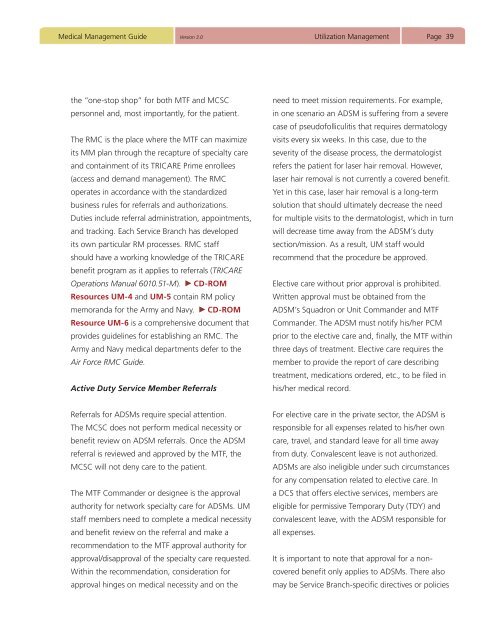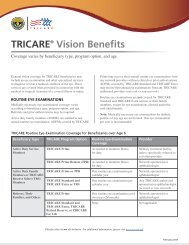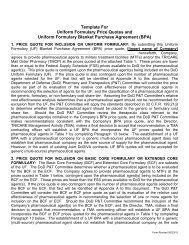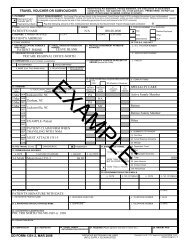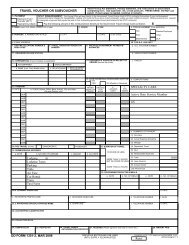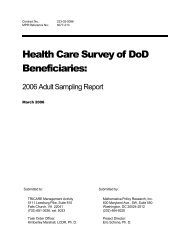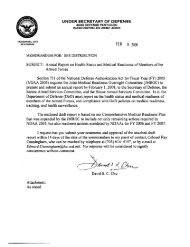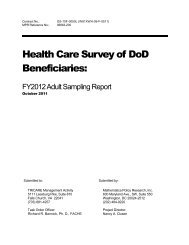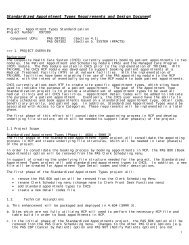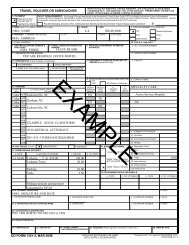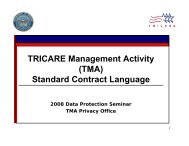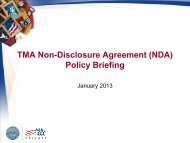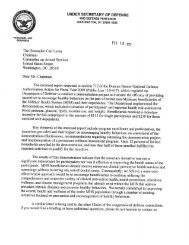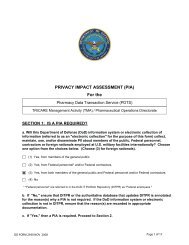Medical Management Guide, 2009, Version 3.0 - Tricare
Medical Management Guide, 2009, Version 3.0 - Tricare
Medical Management Guide, 2009, Version 3.0 - Tricare
- No tags were found...
You also want an ePaper? Increase the reach of your titles
YUMPU automatically turns print PDFs into web optimized ePapers that Google loves.
<strong>Medical</strong> <strong>Management</strong> <strong>Guide</strong><strong>Version</strong> <strong>3.0</strong>Utilization <strong>Management</strong>Page 39the “one-stop shop” for both MTF and MCSCpersonnel and, most importantly, for the patient.The RMC is the place where the MTF can maximizeits MM plan through the recapture of specialty careand containment of its TRICARE Prime enrollees(access and demand management). The RMCoperates in accordance with the standardizedbusiness rules for referrals and authorizations.Duties include referral administration, appointments,and tracking. Each Service Branch has developedits own particular RM processes. RMC staffshould have a working knowledge of the TRICAREbenefit program as it applies to referrals (TRICAREOperations Manual 6010.51-M). CD-ROMResources UM-4 and UM-5 contain RM policymemoranda for the Army and Navy. CD-ROMResource UM-6 is a comprehensive document thatprovides guidelines for establishing an RMC. TheArmy and Navy medical departments defer to theAir Force RMC <strong>Guide</strong>.Active Duty Service Member Referralsneed to meet mission requirements. For example,in one scenario an ADSM is suffering from a severecase of pseudofolliculitis that requires dermatologyvisits every six weeks. In this case, due to theseverity of the disease process, the dermatologistrefers the patient for laser hair removal. However,laser hair removal is not currently a covered benefit.Yet in this case, laser hair removal is a long-termsolution that should ultimately decrease the needfor multiple visits to the dermatologist, which in turnwill decrease time away from the ADSM’s dutysection/mission. As a result, UM staff wouldrecommend that the procedure be approved.Elective care without prior approval is prohibited.Written approval must be obtained from theADSM’s Squadron or Unit Commander and MTFCommander. The ADSM must notify his/her PCMprior to the elective care and, finally, the MTF withinthree days of treatment. Elective care requires themember to provide the report of care describingtreatment, medications ordered, etc., to be filed inhis/her medical record.Referrals for ADSMs require special attention.The MCSC does not perform medical necessity orbenefit review on ADSM referrals. Once the ADSMreferral is reviewed and approved by the MTF, theMCSC will not deny care to the patient.The MTF Commander or designee is the approvalauthority for network specialty care for ADSMs. UMstaff members need to complete a medical necessityand benefit review on the referral and make arecommendation to the MTF approval authority forapproval/disapproval of the specialty care requested.Within the recommendation, consideration forapproval hinges on medical necessity and on theFor elective care in the private sector, the ADSM isresponsible for all expenses related to his/her owncare, travel, and standard leave for all time awayfrom duty. Convalescent leave is not authorized.ADSMs are also ineligible under such circumstancesfor any compensation related to elective care. Ina DCS that offers elective services, members areeligible for permissive Temporary Duty (TDY) andconvalescent leave, with the ADSM responsible forall expenses.It is important to note that approval for a noncoveredbenefit only applies to ADSMs. There alsomay be Service Branch-specific directives or policies


